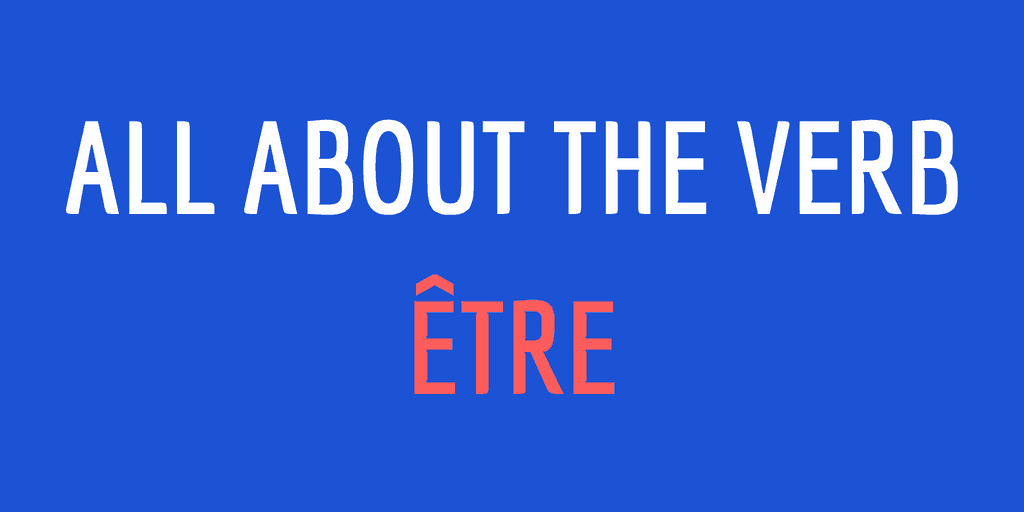The French verb être is one of the most important verbs you could learn in French. Être means “to be” and this highly irregular French verb can be found everywhere – in simple daily conversations, idiomatic expressions, written language, and elsewhere – making it a must-learn for anyone who is starting to learn French.
Here in this article, you’ll learn everything you need to know about this verb: how to use être and être conjugation tables.

Bonus Audio
This article comes with free MP3 files that you can use to practice your listening and pronunciation skills. The audio also doubles as drills for you to familiarize yourself with the conjugation of the verb être, using an effective repetition method.
The audio is included in the fully-packed French Learning Package which you can access for FREE when you signup to join our mailing list.
I. How to use être
3 main ways the French verb être (to be) is used
- Être is used with nouns, adjectives, and adverbs to describe the permanent or temporary state of being. Example: Je suis une amoureuse des animaux. (I am an animal lover.)
- It is also used to indicate possession. Example: C’est mon chien. (It’s my dog.)
- Also to talk about someone’s job or profession. Example: Je suis étudiant. (I am a student.)
Être as an auxiliary verb
- Compound tenses. Être is an auxiliary verb which is used with the past participle of several French verbs to form compound tenses such as the perfect or the past perfect. Example: Je suis allé en France l'année dernière. (I went to France last year.)
- Passive voice. To form the passive tenses in French, être is used, followed by the past participle.
See also: 200 Most Common French Verbs
II. Être Conjugation
Since être is a highly irregular French verb, the conjugation can be quite tricky. It's something that you must master usually by memorizing, or with the help of audio drills.
In this part, let's review the conjugation tables for the French verb être.
Still Stuck at Intermediate French?

Break through the plateau with our proven coaching and study method.
Être Conjugated in the Indicative Mood (INDICATIF)
Pin this for later!

How to conjugate être in the present tense (Présent)
| je suis | I am |
| tu es | you are |
| il/elle est | he/ she is |
| nous sommes | we are |
| vous êtes | you are |
| ils/elles sont | they are |
How to conjugate être in the Imparfait
| j'étais | I was being |
| tu étais | you were being |
| il/elle était | he/she was being |
| nous étions | we were being |
| vous étiez | you all were being |
| ils/elles étaient | they were being |
Futur
| je serai | I will be |
| tu seras | you will be |
| il/elle sera | he/ she will be |
| nous serons | we will be |
| vous serez | you will be |
| ils/elles seront | they will be |
How to conjugate être in passé composé
| j'ai été | I was |
| tu as été | you were |
| il/elle a été | he/ she has been |
| nous avons été | we have been |
| vous avez été | you have been |
| ils/elles ont été | they have been |
How to conjugate être in passé simple
| je fus | I was |
| tu fus | you were |
| il/elle fut | he/ she was |
| nous fûmes | we were |
| vous fûtes | you were |
| ils/elles furent | they were |
être in plus-que-parfait
| j'avais été | I had been |
| tu avais été | you had been |
| il/elle avait été | he/ she had been |
| nous avions été | we had been |
| vous aviez été | you had been |
| ils/elles avaient été | they had been |
être in passé antérieur
| j'eus été | I had been |
| tu eus été | you had been |
| il/elle eut été | he/ she had been |
| nous eûmes été | we had been |
| vous eûtes été | you had been |
| ils/elles eurent été | they had been |
être in futur antérieur
| j'aurai été | I will have been |
| tu auras été | you will have been |
| il/elle aura été | he/ she will have been |
| nous aurons été | we will have been |
| vous aurez été | you will have been |
| ils/elles auront été | they will have been |
Être in the Subjunctive Mood (SUBJONCTIF)
Présent
| que je sois | that I am |
| que tu sois | that you are |
| qu'il/elle soit | that he/ she is |
| que nous soyons | that we are |
| que vous soyez | that you are |
| qu'ils/elles soient | that they are |
Imparfait
| que je fusse | that I would be |
| que tu fusses | that you would be |
| qu’il/elle/on fût | that he/she would be |
| que nous fussions | that we would be |
| que vous fussiez | that you would be |
| qu’ils/elles fussent | that they would be |
Passé
| que j'aie été | that I have been |
| que tu aies été | that you have been |
| qu'il/elle ait été | that he/ she have been |
| que nous ayons été | that we have been |
| que vous ayez été | that you have all been |
| qu'ils/elles aient été | that they have been |
Plus-que-parfait
| que j'eusse été | that I would have been |
| que tu eusses été | that you would have been |
| qu'il/elle eût été | that he/she would have been |
| que nous eussions été | that we would have been |
| que vous eussiez été | that you all would have been |
| qu'ils/elles eussent été | that they would have been |
Être in the Conditional Mood (CONDITIONNEL)
Présent
| je serais | I would be |
| tu serais | you would be |
| il/elle serait | he/she would be |
| nous serions | we would be |
| vous seriez | you would be |
| ils/elles seraient | they would be |
Passé (1ère forme)
| j'aurais été | I would have been |
| tu aurais été | you would have been |
| il/elle aurait été | he/she would have been |
| nous aurions été | we would have been |
| vous auriez été | you would have been |
| ils/elles auraient été | they would have been |
Passé (2ème forme)
| j'eusse été | I would have been |
| tu eusses été | you would have been |
| il/elle eût été | he/she would have been |
| nous eussions été | we would have been |
| vous eussiez été | you would have been |
| ils/elles eussent été | they would have been |
PARTICIPE
Présent
étant
Passé
PARTICIPE PASSÉ COMPOSÉ
Être Conjugated in the Imperative Mood (IMPÉRATIF)
Présent
Passé
Être in the Infinitive Mood (INFINITIF)
Présent
être
Passé
avoir été
III. Quick Exercise: Fill in the blanks!
1. Je ____ Français (I am French)
Click to reveal the answer
2. Tu ____gentil (You are nice)
Click to reveal the answer
3. Elle ____ jolie (She is cute)
Click to reveal the answer
4. Il _____ sérieux (He is serious)
Click to reveal the answer
5. Nous ____ étudiants (We are students)
Click to reveal the answer
See also: French Verbs Conjugation Quiz
IV. Conclusion
This etre conjugation tables will surely make mastering the French verb être easier!
Être is a super-charged, widely-used French verb that you should spend time getting to know along with other most commonly used verbs such as avoir, dire, être, faire, finir, manger, pouvoir, savoir,venir, voir, and vouloir.
But would you believe me if I say that you can master the different conjugations of these verbs without any rote memorization? All you need is a handy pack of audio drills to listen to and practice everyday.
Do you still find these etre conjugations difficult? Check out the French Verb Conjugation Course and see how you can learn French verb tenses naturally.
Still Stuck at Intermediate French?

Break through the plateau with our proven coaching and study method.
Here are some FAQs about French Verb Être
How do you use être in French?
Être is a verb meaning “to be” in English. Just like the verb “to be,” être is also an extremely versatile and irregular verb. The most basic usage of être is to attribute a trait or describe the state of the subject:
Je suis heureux/heureuse ! (I am happy!)
Nancy est petite. (Nancy is small.)
Nous sommes à la maison. (We are at home.)
Être is also commonly used to indicate possession, or to talk about one’s profession:
C’est ton chat, non? (That’s your cat, isn’t it?)
Elle est médecin. (She’s a doctor.)
What is the présent conjugation for être?
The present tense conjugation for être is as follows:
Je suis (I am)
Tu es (you are)
Il/elle/on est (he/she/it is)
Nous sommes (we are)
Vous êtes (you [plural or formal] are)
Ils/elles sont (they are)
What verbs do you use être with?
The article has managed to discuss all conjugations for the French verb être. However, être and avoir are both very odd verbs, and can often switch places. In fact, être takes the place of avoir as the auxiliary verb when conjugating certain verbs to the passé composé.
“Dr Mrs P. Vandertramp” is a very popular tool for French language learners to memorise irregularly conjugated verbs in the past participle, or the passé composé. This is an acronym, so each letter represents a verb. It is known as the “House of Être” because all of these verbs use être as their auxiliary. However, please note that not all verbs using être are included in this abbreviation.
Here is the list of Dr Mrs P. Vandertramp verbs:
Devenir (to become): devenu
Revenir (to come back): revenu
Monter (to climb): monté
Rester (to stay): resté
Sortir (to leave): sorti
Passer (to pass): passé
Venir (to come): venu
Aller (to go): allé
Naître (to be born): né
Descendre (to descend): descendu
Entrer (to enter): entré
Rentrer (to re-enter): rentré
Tomber (to fall): tombé
Retourner (to turn around): retourné
Arriver (to arrive/come): arrivé
Mourir (to die): mort
Partir (to leave): parti
Now here are some examples of conjugated verbs from Dr Mrs P. Vandertramp in the past participle. Remember subject-verb agreements – an extra -e for females, and an -s for multiple subjects.
subject + être (présent) + Dr Mrs P Vandertramp verb (passé composé)
Je suis allé (I went)
Elle est tombée (She fell)
Vous êtes venu (You came)
Nous sommes entrés (We entered)
Ils sont revenus (They came back)

Thank you I enjoyed your Etre explanations.
Merci Mike
Thanks I enjoyed the lesson